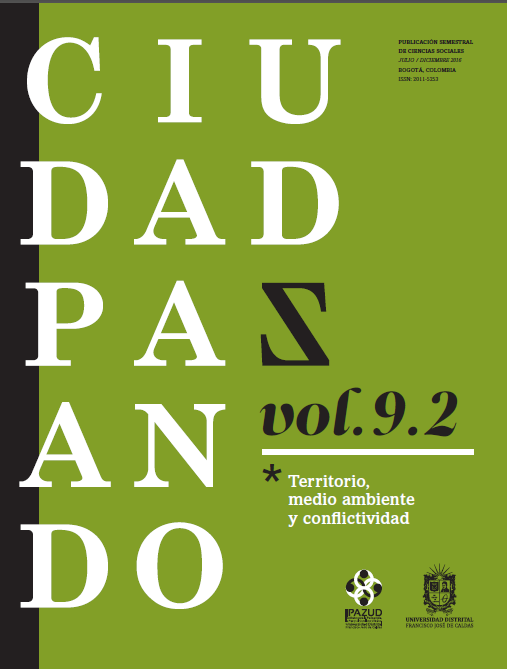DOI:
https://doi.org/10.14483/2422278X.11408Publicado:
2016-12-26Número:
Vol. 9 Núm. 2 (2016): Julio - diciembre. Territorio, medio ambiente y conflictividadSección:
ReseñasProcesos socio-territoriales Orinoquía: itinerarios y tendencias
Palabras clave:
Orinoquía, conflicto social (es).Descargas
Resumen (es)
El libro tiene como propósito comprender la importancia que ha adquirido la Orinoquía en la actual fase de acumulación capitalista, y en particular, analizar “su configuración como espacio de emergencia y reproducción de conflictos socio-territoriales y de nuevas formas y expresiones del antagonismo social” (Estrada et al. 2014: 18). En otras palabras, busca destacar que, de la mano de la importancia estratégica que ha adquirido la Orinoquía a raíz de las dinámicas económicas que allí se vienen registrando, se ha recreado una conflictividad social que involucra a diversos grupos humanos que la habitan, en particular, a las comunidades indígenas, campesinas y a sectores de la clase obrera. Para dar desarrollo al planteamiento, el libro está estructurado en dos partes, que a su vez, se subdividen en varias secciones.
Cómo citar
APA
ACM
ACS
ABNT
Chicago
Harvard
IEEE
MLA
Turabian
Vancouver
Descargar cita
Licencia
La Revista Ciudad Paz-ando (RCP) es una publicación de acceso abierto, sin cargos económicos para autores ni lectores, cuyas publicaciones semestrales se realizan bajo los términos de la Licencia Creative Commons Atribución – No comercial – Compartir igual (CC-BY-NC-SA 2.5 CO), con la cual otros podrán distribuir, remezclar, retocar, y crear a partir de la obra de modo no comercial, siempre y cuando den crédito y licencien sus nuevas creaciones bajo las mismas condiciones.
El titular de los derechos de autor es la revista Ciudad Paz-ando, conservando todos los derechos sin restricciones, respetando los términos de la licencia en cuanto a la consulta, descarga y distribución del material.
Cuando la obra o alguno de sus elementos se hallen en el dominio público según la ley vigente aplicable, esta situación no quedará afectada por la licencia.
Asimismo, incentivamos a los autores a depositar sus contribuciones en otros repositorios institucionales y temáticos, con la certeza de que la cultura y el conocimiento es un bien de todos y para todos.

